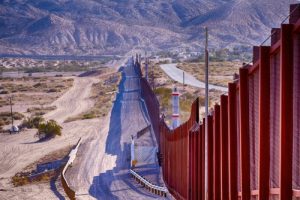
The U.S. Department of Homeland Security (DHS) must address the negative impacts of illegal immigration at the nation’s southern border on federally protected areas and tribal lands, according to U.S. Rep. Blake Moore (R-UT).
“The crisis at the southern border continues to worsen at a rapid pace,” wrote Rep. Moore and his colleague U.S. Rep. Bruce Westerman (R-AR) in a June 2 letter sent to DHS Secretary Alejandro Mayorkas. “President Biden’s border policies not only place our nation’s security at risk and increase the flow of illicit drugs, especially fentanyl, into our country, but also degrade our federal lands along the border.”
Rep. Moore and his colleague, who both serve on the U.S. House Natural Resources Committee, wrote that recent reporting describes a significant accumulation of garbage along the Rio Grande in Texas, including discarded clothing, hygiene items and plastics along a path used by migrants to cross the border. And their concerns “were affirmed and, at times, magnified” by firsthand observations made during recent visits to the southern border, they wrote.
“Sadly, reports like this are neither surprising nor unique,” wrote the lawmakers. “The environmental consequences of illegal immigration are well known, resulting in the endangerment of wildlife, decimation of habitats, and destruction of vegetation.”
Additionally, the increased drug flow into American communities from failed border policies is poisoning people across the country, wrote the congressmen, adding that tribal communities closest to the southern border experience particularly high rates of overdose and addiction from fentanyl and other opioids smuggled across the border.
To ensure DHS includes the impacts on federally protected environmental areas and tribal communities in its preparation for expected migrant surges at the southern border, and to assist their committee with oversight activities, Reps. Moore and Westerman requested that Mayorkas provide them with detailed information by June 16.
For instance, among several documents, they requested those describing the current level of environmental damage to federally protected and tribal lands along the southern border, including, but not limited to, habitat destruction, wildlife deaths and accumulation of garbage; and all documents and communications related or referring to the coordination of garbage removal efforts along the southern border, including cleanups hosted by the U.S. Bureau of Land Management.
“We urge you to address the environmental damage caused by illegal migrants and the possible increase in illegal drug flow to tribal communities as part of your immigration enforcement strategy,” they wrote.



